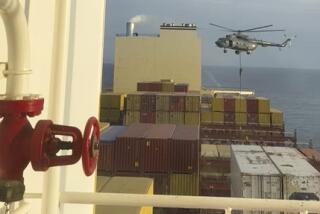New Threat From Iran
- Share via
About half the world’s oil is produced near the shores of the Persian Gulf and then shipped to world markets through the Strait of Hormuz. Free passage through that choke point is thus a matter of prime strategic importance.
That’s why the United States continues to keep a wary watch on military developments in the area. Lately, says U.S. Defense Secretary William Perry, Iran has been building up its military forces on three disputed islands near the strait. It has moved 6,000 troops to the offshore sites, along with Chinese-made Silkworm anti-ship missiles, last seen in action during the Iraq-Iran war in the 1980s. It has also deployed U.S.-made Hawk antiaircraft missiles, originally supplied to the late shah’s armed forces in the 1970s and, curiously, chemical weapons. The latter seems an odd choice in an area where steady breezes would appear to make their use highly chancy, but Perry insists the weapons have been detected.
Perry describes the Iranian buildup as a “potential threat to shipping” through the strait. For now the emphasis ought to be on potential. Iranian interference with oil traffic would make little sense, given its own dependence on the gulf’s shipping lanes. Nonetheless, the local buildup, along with Iran’s acquisition of two Russian submarines and five fast-attack Chinese patrol boats, does raise questions about Tehran’s intentions. Those Russian subs, for example, can be used to lay mines. Mine laying during the Iran-Iraq war seriously threatened traffic in the southern gulf.
Perry called attention to the Iranian buildup during his visit to six gulf states, a key purpose of which was to obtain agreement on further advance positioning of war supplies so that if U.S. land forces were again sent to the region a division’s worth of heavy equipment would already be in place.
Anything that threatens the free flow of oil from the gulf imperils global economic stability and U.S. interests. Until recently it was assumed the chief threat would continue to come from Iraq. Now Washington has put a second candidate on its list. An overreaction? Maybe. But far better to treat Iran’s buildup with caution than with indifference.
More to Read
Sign up for Essential California
The most important California stories and recommendations in your inbox every morning.
You may occasionally receive promotional content from the Los Angeles Times.










